英语句子成分分析分析解析
英语句子成分及结构讲解分析划分和练习和答案解析

句子结构及成分①相关概念1.词性的英文缩写在英语学习中,掌握单词词性非常重要。
如果我们在记单词的时只记拼写、读音而不记词性的话,我们就不知道如何使用它们,所以我们在记单词时一定要把单词词性记准记牢。
缩写字母原词代表词性n. noun 名词v。
verb 动词vt.transitive verb 及物动词vi.intransitive verb 不及物动词modal v. modal verb 情态动词aux。
v. auxiliary verb 助动词adj.adjective 形容词adv.adverb 副词num。
numeral 数词interj. interjection 感叹词pron. pronoun 代词prep.preposition 介词art。
article 冠词conj conjunction 连词2.及物动词和不及物动词实义动词后面跟宾语时,这个动词是及物动词。
实义动词后面不跟宾语时,此时这个动词是不及物动词.The door opened。
(open后面没跟宾语,此时,open是不及物动词。
) He opened the door。
(open后面有宾语the door,此时,open是及物动词.)注意:英语中一个动词是及物动词还是不及物动词,关键是看它用在句中时后面是否跟宾语。
有些动词既可作及物动词又可作不及物动词,词义相同。
如:The meeting began at six。
〈 vi.〉We began the meeting at six。
〈 vt。
〉有(答疑qq 329950885)些动词既可作及物动词又可作不及物动词,但词义不同.如:The man walked away. (walk不及物动词,意为“走”) He walked the dog every day. ( walk及物动词,“遛”)She washes clothes at home. (wash及物动词,“洗”)The clothes washes well. (wash不及物动词,“耐洗”)英语中一些单词是及物还是不及物,可能与汉语不同。
英语句子成分及五种基本句型解析ppt课件

篮球比赛是根据运动队在规定的比赛 时间里 得分多 少来决 定胜负 的,因 此,篮 球比赛 的计时 计分系 统是一 种得分 类型的 系统
基本句型1:主+谓
此句型的句子有一个共同特点,即句子的谓语动词都能表达 完整的意思。 这类动词叫做不及物动词,后面可以跟副词、介词短语、 状语从句等。
•The sun was shining.
介词短语
My job is to teach English.
不定式
Seeing is believing.
动名词
篮球比赛是根据运动队在规定的比赛 时间里 得分多 少来决 定胜负 的,因 此,篮 球比赛 的计时 计分系 统是一 种得分 类型的 系统
基本句型2:主有一个共同的特点:句子谓语动词都不能表达一个完整的 意思,必须加上一个表明主语身份或状态的表语构成复合谓语,才能表 达完整的意思。这类动词叫做连系动词。
太阳在照耀着。
2. Who cares?
管它呢?
3. What he said does not matter. 他所讲的没有什么关系。
4. They talked for half an hour. 他们谈了半个小时。
篮球比赛是根据运动队在规定的比赛 时间里 得分多 少来决 定胜负 的,因 此,篮 球比赛 的计时 计分系 统是一 种得分 类型的 系统
什么可以作谓语?
We love China. We have finished reading this book. He can speak English.
及物动词 vt
My mother usually gets up early. The boy often plays in his yard. 不及物动词 vi
英语句子成分分析
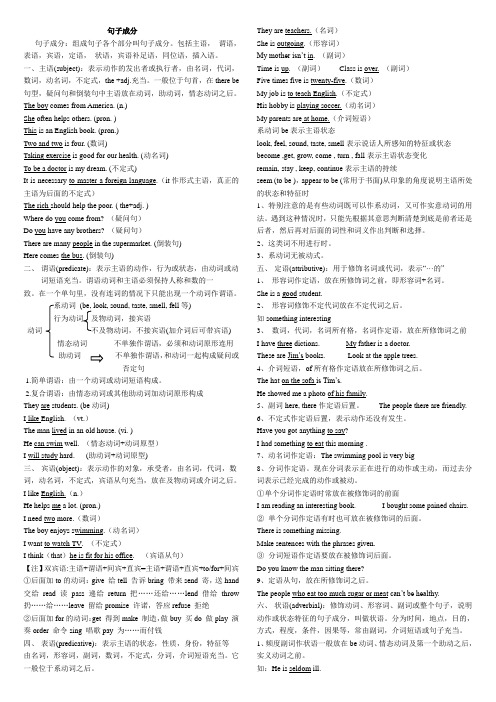
句子成分句子成分:组成句子各个部分叫句子成分。
包括主语,谓语,表语,宾语,定语,状语,宾语补足语,同位语,插入语。
一、主语(subject):表示动作的发出者或执行者,由名词,代词,数词,动名词,不定式,the +adj.充当。
一般位于句首,在there be句型,疑问句和倒装句中主语放在动词,助动词,情态动词之后。
The boy comes from America. (n.)She often helps others. (pron. )This is an English book. (pron.)Two and two is four. (数词)Taking exercise is good for our health. (动名词)To be a doctor is my dream. (不定式)It is necessary to master a foreign language.(it作形式主语,真正的主语为后面的不定式)The rich should help the poor. ( the+adj. )Where do you come from? (疑问句)Do you have any brothers? (疑问句)There are many people in the supermarket. (倒装句)Here comes the bus. (倒装句)二、谓语(predicate):表示主语的动作,行为或状态,由动词或动词短语充当。
谓语动词和主语必须保持人称和数的一致。
在一个单句里,没有连词的情况下只能出现一个动词作谓语。
系动词(be, look, sound, taste, smell, fell等)行为动词及物动词,接宾语动词不及物动词,不接宾语(加介词后可带宾语)情态动词不单独作谓语,必须和动词原形连用助动词不单独作谓语,和动词一起构成疑问或否定句1.简单谓语:由一个动词或动词短语构成。
(完整word版)英语句子成分分析
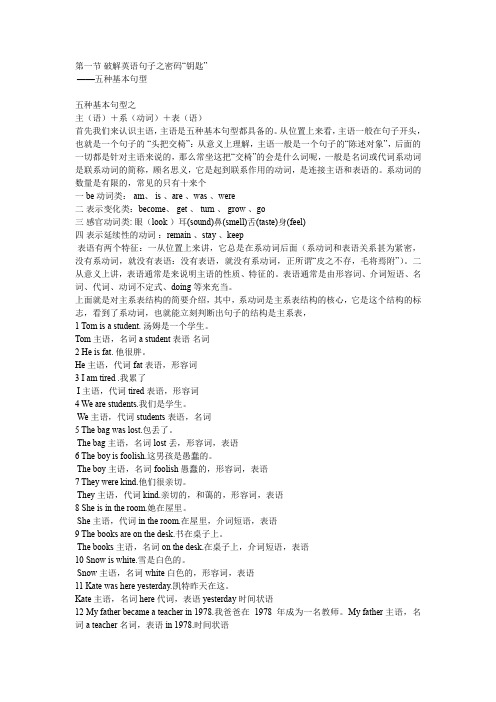
第一节破解英语句子之密码“钥匙”——五种基本句型五种基本句型之主(语)+系(动词)+表(语)首先我们来认识主语,主语是五种基本句型都具备的。
从位置上来看,主语一般在句子开头,也就是一个句子的“头把交椅”:从意义上理解,主语一般是一个句子的“陈述对象”,后面的一切都是针对主语来说的,那么常坐这把“交椅”的会是什么词呢,一般是名词或代词系动词是联系动词的简称,顾名思义,它是起到联系作用的动词,是连接主语和表语的。
系动词的数量是有限的,常见的只有十来个一 be动词类: am、 is 、are 、was 、were二表示变化类:become、 get 、 turn 、 grow 、go三感官动词类: 眼(look )耳(sound)鼻(smell)舌(taste)身(feel)四表示延续性的动词:remain 、stay 、keep表语有两个特征:一从位置上来讲,它总是在系动词后面(系动词和表语关系甚为紧密,没有系动词,就没有表语:没有表语,就没有系动词,正所谓“皮之不存,毛将焉附”)。
二从意义上讲,表语通常是来说明主语的性质、特征的。
表语通常是由形容词、介词短语、名词、代词、动词不定式、doing 等来充当。
上面就是对主系表结构的简要介绍,其中,系动词是主系表结构的核心,它是这个结构的标志,看到了系动词,也就能立刻判断出句子的结构是主系表,1 Tom is a student. 汤姆是一个学生。
Tom主语,名词 a student表语名词2 He is fat. 他很胖。
He主语,代词 fat表语,形容词3 I am tired .我累了I 主语,代词 tired表语,形容词4 We are students.我们是学生。
We 主语,代词 students表语,名词5 The bag was lost.包丢了。
The bag 主语,名词 lost丢,形容词,表语6 The boy is foolish.这男孩是愚蠢的。
英语句子成分划分讲解精编版

英语句子成分划分讲解精编版
英语句子成分划分是理解句子结构和意义的关键。
一个完整的英语句子通常包含主语、谓语、宾语、定语、状语、补语等成分。
下面是对这些成分的详细讲解:
1. 主语(Subject):表示句子主要描述的对象,通常位于句子的开始位置。
例如:The cat(主语) sat on the mat.
2. 谓语(Predicate):表示主语执行的动作或状态,紧跟在主语之后。
例如:The cat(主语) sat(谓语).
3. 宾语(Object):表示动作的接受者或行为的受益者,可以出现在句子
的不同位置。
例如:The cat(主语) played with a ball(宾语).
4. 定语(Adjective):修饰名词,描述名词的特征或属性。
例如:The big cat(定语+名词) sat on the mat.
5. 状语(Adverbial):修饰动词、形容词或副词,描述动作发生的时间、
地点、方式等。
例如:The cat(主语) sat(谓语) quietly(状语).
6. 补语(Complement):补充说明主语或宾语的身份、状态或特征。
例如:The cat(主语) was a kitten(补语).
通过理解这些成分,可以更好地分析句子的结构和意义,提高阅读和写作能力。
同时,要注意英语句子结构的多样性和复杂性,同一个句子成分在不同的语境下可能有不同的含义和功能。
高中英语句子成分解析
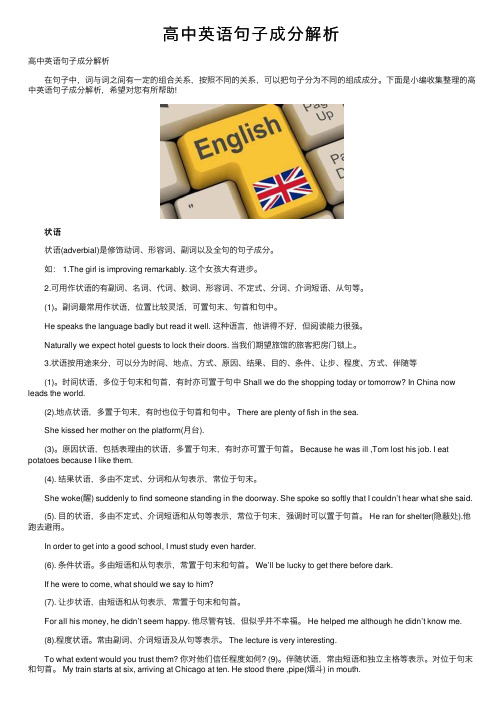
⾼中英语句⼦成分解析⾼中英语句⼦成分解析 在句⼦中,词与词之间有⼀定的组合关系,按照不同的关系,可以把句⼦分为不同的组成成分。
下⾯是⼩编收集整理的⾼中英语句⼦成分解析,希望对您有所帮助!状语 状语 状语(adverbial)是修饰动词、形容词、副词以及全句的句⼦成分。
如: 1.The girl is improving remarkably. 这个⼥孩⼤有进步。
2.可⽤作状语的有副词、名词、代词、数词、形容词、不定式、分词、介词短语、从句等。
(1)。
副词最常⽤作状语,位置⽐较灵活,可置句末、句⾸和句中。
He speaks the language badly but read it well. 这种语⾔,他讲得不好,但阅读能⼒很强。
Naturally we expect hotel guests to lock their doors. 当我们期望旅馆的旅客把房门锁上。
3.状语按⽤途来分,可以分为时间、地点、⽅式、原因、结果、⽬的、条件、让步、程度、⽅式、伴随等 (1)。
时间状语,多位于句末和句⾸,有时亦可置于句中 Shall we do the shopping today or tomorrow? In China now leads the world. (2).地点状语,多置于句末,有时也位于句⾸和句中。
There are plenty of fish in the sea. She kissed her mother on the platform(⽉台). (3)。
原因状语,包括表理由的状语,多置于句末,有时亦可置于句⾸。
Because he was ill ,Tom lost his job. I eat potatoes because I like them. (4). 结果状语,多由不定式、分词和从句表⽰,常位于句末。
She woke(醒) suddenly to find someone standing in the doorway. She spoke so softly that I couldn’t hear what she said. (5). ⽬的状语,多由不定式、介词短语和从句等表⽰,常位于句末,强调时可以置于句⾸。
英语句子成分分析
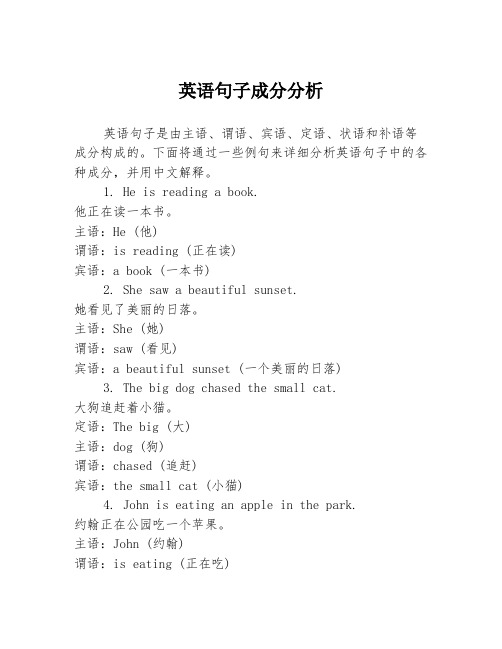
英语句子成分分析英语句子是由主语、谓语、宾语、定语、状语和补语等成分构成的。
下面将通过一些例句来详细分析英语句子中的各种成分,并用中文解释。
1. He is reading a book.他正在读一本书。
主语:He (他)谓语:is reading (正在读)宾语:a book (一本书)2. She saw a beautiful sunset.她看见了美丽的日落。
主语:She (她)谓语:saw (看见)宾语:a beautiful sunset (一个美丽的日落)3. The big dog chased the small cat.大狗追赶着小猫。
定语:The big (大)主语:dog (狗)谓语:chased (追赶)宾语:the small cat (小猫)4. John is eating an apple in the park.约翰正在公园吃一个苹果。
主语:John (约翰)谓语:is eating (正在吃)宾语:an apple (一个苹果)地点状语:in the park (在公园)5. The teacher gave every student a book.老师给每个学生一本书。
定语:The (老师)谓语:gave (给予)间接宾语:every student (每个学生)直接宾语:a book (一本书)6. She sings beautifully.她唱得很美。
主语:She (她)谓语:sings (唱)方式状语:beautifully (美)7. The weather is extremely cold today.今天的天气非常冷。
主语:The weather (天气)谓语:is (是)状语:extremely cold (非常冷)时间状语:today (今天)8. The flowers smell lovely.这些花闻起来很好闻。
主语:The flowers (这些花)谓语:smell (闻起来)表语:lovely (好闻)以上是几个例句的分析,通过对英语句子的成分进行分析,我们能够更好地理解句子的结构和语法规则。
英语句子成分分析(多版本)
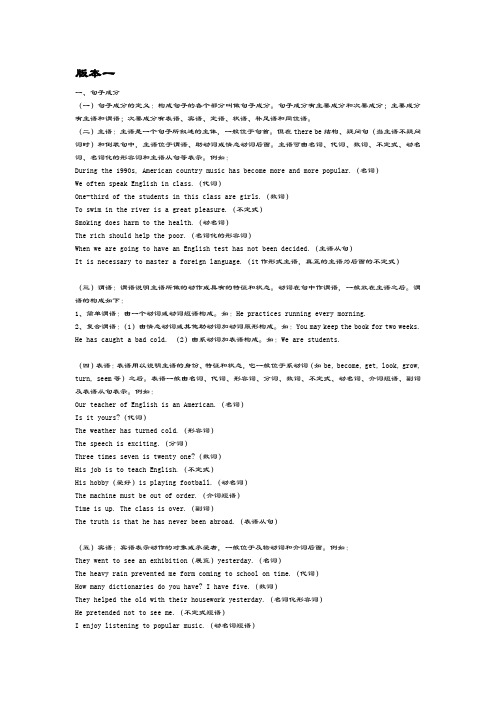
版本一一、句子成分(一)句子成分的定义:构成句子的各个部分叫做句子成分。
句子成分有主要成分和次要成分;主要成分有主语和谓语;次要成分有表语、宾语、定语、状语、补足语和同位语。
(二)主语:主语是一个句子所叙述的主体,一般位于句首。
但在there be结构、疑问句(当主语不疑问词时)和倒装句中,主语位于谓语、助动词或情态动词后面。
主语可由名词、代词、数词、不定式、动名词、名词化的形容词和主语从句等表示。
例如:During the 1990s, American country music has become more and more popular.(名词)We often speak English in class.(代词)One-third of the students in this class are girls.(数词)To swim in the river is a great pleasure.(不定式)Smoking does harm to the health.(动名词)The rich should help the poor.(名词化的形容词)When we are going to have an English test has not been decided.(主语从句)It is necessary to master a foreign language.(it作形式主语,真正的主语为后面的不定式)(三)谓语:谓语说明主语所做的动作或具有的特征和状态。
动词在句中作谓语,一般放在主语之后。
谓语的构成如下:1、简单谓语:由一个动词或动词短语构成。
如:He practices running every morning.2、复合谓语:(1)由情态动词或其他助动词加动词原形构成。
如:You may keep the book for two weeks. He has caught a bad cold. (2)由系动词加表语构成。
- 1、下载文档前请自行甄别文档内容的完整性,平台不提供额外的编辑、内容补充、找答案等附加服务。
- 2、"仅部分预览"的文档,不可在线预览部分如存在完整性等问题,可反馈申请退款(可完整预览的文档不适用该条件!)。
- 3、如文档侵犯您的权益,请联系客服反馈,我们会尽快为您处理(人工客服工作时间:9:00-18:30)。
He pushed the door open. →The door was pushed open.
㈥定语
He is a clever boy. (形容词)
His father works in a steel work. (名词) There are 54students in our class.(数词) Do you known Betty’s sister? (名词的所有格 He bought some sleeping pills.(动名词) There is a sleeping baby in bed. (现在分词) His spoken language is good. (过去分词)
The apple tastes sweet.
1. The war was over. 2. They seem to know the truth. 3. Time is precious. 4. I’m not quite myself today. 5. Who was the first? 6. He is out of condition. 7. The book is what I need.
1. Time flies fast. 2. There will be a good meal for us at our aunt’s. 3. The rive rose ten feet in the night. 4. I heard him shout. 5. He bought some sweets for his son. 6. I prefer my coffee hot. 7. Don’t worry about me; just take care of yourself. 8. You can rely on him to do anything that is necessary. 9. A lot of noise is going on outside. 10. The little girl can dress herself now. 11. It was a pity that you didn’t watch that wonderful match. 12. I felt my heart beat rapidly. 13. Do you want to come to the party? 14. We should do something to help the students in difficulties. 15. How long have you worked in the hospital?
I will be back in a while. They are playing on the playground. He was late because he got up late. He got up so late that I missed the
train.
I waited to see you. He often went to school by bus. His parents died,leaving him an
He went. He went there. He went there yesterday. He went there to see his mother
yesterday. He went there to see his mother ill in
hospital by bike yesterday.
名词、 This is Mr. Li, our 数词、 headmaster. 代词或 The news that he is ill 从句 worries us.
感叹词 Oh, hello, I think, to tell
副词短 you the truth, Mr. Li, Your
语
Majesty, Mum. Yes, no
↓↓ ↓ ↓
↓
↓
↓
主谓 定 宾 同
宾
状
语语 语 语 位
语
语
语
补
足
语
句子 英文名
成分
说明
常用词类 例句
主语 subject
句子所要说明的动作或状 名词、代词, I am a 态的主体(人或事物) 动名词,不定 student.
式,从句等
谓语 predicate 表示主语的动作或状态 动词
You read the book.
away. He likes pop music.
I stayed awake until 11:30 one evening in order to have a good look at the moon for once by myself.
Anne named her diary kitty because she thought it was her best friend.
表语
predicativ 放在连系动词后表示主语
e
的身份或特征。
名词、代词、 She is a 形容词,动名 teacher. 词,分词,不定 式,介词短语, 从句等
宾 object 语
表示及物动词动作的对 象
名词、代 Mike did the 词,动名 job. 词,不定 式,从句 等
定 attribute 限定或修饰名词、代词 形容词, The black dog
㈢表语
在系动词后的部分就是表语 常见的系动词有:
be (am,is,are,were,was), appear, seem, feel, smell, taste, sound, look, get, grow, keep, turn, become, come, go ,remain,etc.
(现在分词短语)
The bridge built only one year ago is broken. Do you know the man who spoke just now?
(从句)㈦ຫໍສະໝຸດ 语用于修饰形容词,副词,动词,介词短语或 句子.可表示时间,地点,原因,结果,目的,方 式,伴随,条件,程度,让步,频率等.
Exercises:分析句子结构
You are a student. He felt happy today. What you said made me happy. Could you give me some advice on how to
learn English well? After he finished his homework, he went
同位 apposit 对前面的名词
语 ive
或代词做进一
步解释。
独立 Indepe 与全句没有什
成分 ndent 么语法关系,
elemen 有感叹词、肯
ts
定与否定的答
语、插入语、
呼语等
常用词 例句 类
名词、 I find the book very boring. 形容词, 分词, 不定式 介词短 语等
㈠主语
Jane is good at playing the piano. She went out in a hurry. Four plus four is eight. To see is to believe. Smoking is bad for health. The young should respect the old. What he has said is true.
基本句型
主语+系动词+表语(主系表) 主语+不及物动词+其他成分 (主谓) 主语+及物动词+宾语(主谓宾) 主语+及物动词+间接宾语+直接宾语(主谓双宾) 主语+及物动词+宾语+宾补
简单句的五种形式
S+P I am astonished. S+V Albert Einstein’s name never dies. The book sells
orphan. Please call me if it is necessary. This book is very interesting. He went to school in spite of his
illness. He always comes late to school.
㈣宾语
宾语分为直接宾语和间接宾语.直接宾语指 物,间接宾语指人.
He gave me some books.
↓
↓
间接 直接
宾语 宾语
● Please pass me the book. ● He bought me some flowers. ● I like my job. ● I love you. ● He wanted to leave here. ● They enjoyed playing computer games. ● I didn’t know when to switch the
machine off. ● She wondered why Jim was so angry
with her.
㈤宾语补足语
We must keep it a secret. I found the book interesting. Please keep the dog out. Please make yourself at home. She asked me to lend her a hand. Do you smell something burning? She had an arm broken in the accident. He made himself known to them.
